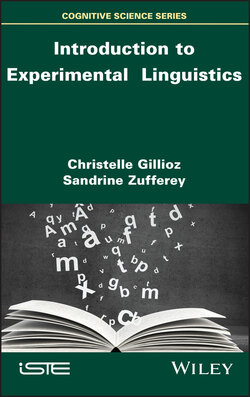Читать книгу Introduction to Experimental Linguistics - Sandrine Zufferey - Страница 12
1.2.1. Research questions and hypotheses
ОглавлениеWe have already emphasized that experimental research is part of a scientific process. It builds on existing knowledge in a research field and aims to increase such knowledge by studying a research question generated on the basis of an existing theory. A scientific research question identifies the potential cause for a phenomenon and postulates a cause to effect relation between the cause and phenomenon. For example, the question “how do we understand a text?” is not a research question, as it is too vague. Such a question corresponds to a general research topic, from which many research questions can emanate. On the other hand, a question such as “what is the role of memory in readers’ comprehension of a text?” is a research question that can be investigated empirically. This question identifies a cause – memory – and a consequence – text comprehension –, and establishes a relation between the two.
Once the research question has been defined, it is necessary to transform it into a research hypothesis, which corresponds to an empirically testable statement. In other words, the hypothesis must be confirmed or rejected on the basis of objective data. In order to do this, the research hypothesis must be operationalized, that is, it is necessary to specify which variables will be examined and how these variables will be measured, in order to collect relevant data for the experiment.
If we go back to our example above, memory is still a vague concept. As a matter of fact, a distinction is generally made between long-term memory, short-term memory and working memory. Working memory is a system that simultaneously stores and processes verbal elements (verbal working memory) or visual elements (visuospatial working memory). It is typically the verbal working memory that we use for reading, for deciphering and for putting together the words in a sentence. The operational hypothesis should therefore define what type of memory will be the object of study, verbal working memory, for example.
In the same way, the operational hypothesis should explain the way in which reading comprehension will be measured. Reading comprehension involves many steps, from deciphering words to relating these words in a sentence, and then to a text. Therefore, it is impossible to measure reading comprehension in only one way or with one type of experiment. We need to narrow down this notion to a more precise variable, corresponding to a process involved in reading comprehension that can be measured. For example, this could be the elements included in the readers’ representation of the text and stored in memory once the reading has finished. One way to assess comprehension would be to ask questions about the text at the end of reading and count the number of correct answers.
Let us look at a few more examples to understand what a research hypothesis is:
1 (1) Bilinguals have different cognitive abilities from monolinguals.
2 (2) Reading and understanding a text is difficult for children.
The above-mentioned hypotheses cannot be the basis of experimental research since they do not meet the criteria listed above. Their terms are too vague, they specify neither the cause nor the effect, and do not specify any measure to rely on so as to draw conclusions.
In order to be tested empirically, these hypotheses could be transformed into (3) and (4):
1 (3) Bilinguals perform better than monolinguals at a cognitive flexibility task.
2 (4) When reading a text, 10–12-year-old children draw fewer inferences than 14–16-year-old teenagers.
In these two examples we see that the vague terms used in (1) and (2) have been transformed into accurate terms in (3) and (4). Cognitive skills became performance during a cognitive flexibility task, and understanding a text became drawing inferences. By doing this, measures for quantifying the variables were defined. In addition, (4) specifies which groups will be included and compared in the study. Finally, both (3) and (4) indicate a clear relationship between variables.
In summary, a research hypothesis is based on existing knowledge in order to establish a relationship between two or more variables. It must also be operationalized, that is, clearly defining the measures that will be used for quantifying the variables being examined to verify the hypothesis.
The construction of a good research hypothesis is the result of different stages, among which the most important are conceptualizing the hypothesis, on the basis of knowledge acquired in the field, and then operationalizing the hypothesis. We will discuss the specific stages for conceptualizing a hypothesis in Chapter 6, which is devoted to the practical aspects of an experiment. We will discuss the stages involved in the operationalization of a hypothesis in Chapter 2.
